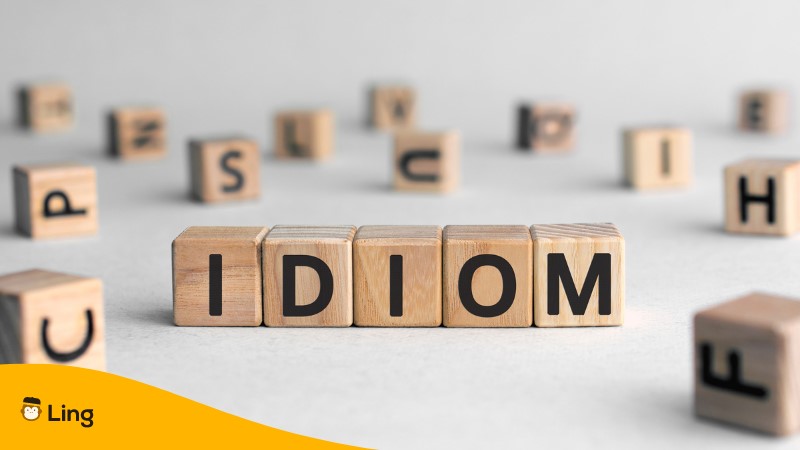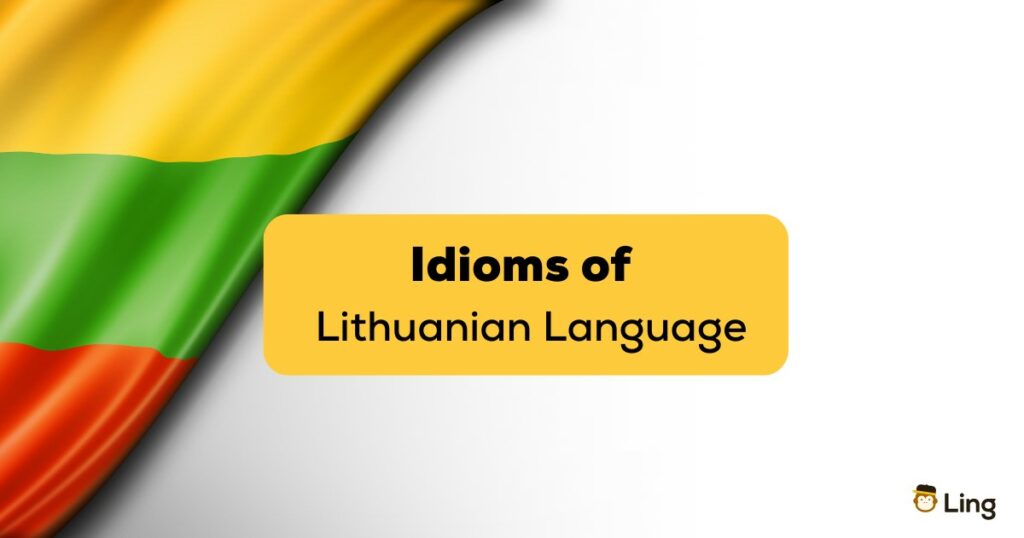Have you ever heard this phrase: Eiti pas nykštukus? It is one of the hilarious Lithuanian idioms that literally translates to “visiting the dwarves.” But no one is stepping into the fantasy land! It’s just an expression to convey that you need to visit the washroom.
You have probably heard already that the Lithuanian language is one of the oldest languages in Europe to be spoken even today. This seemingly small country, that not many have heard about, has a proud heritage and unique history. And in this blog post, we are diving in even more into the Lithuanian language by introducing you to Lithuanian idioms.
Table Of Contents
Lithuanian Idioms
As in any language, knowing the words or having extensive vocabulary in that language doesn’t always mean you can understand what is said. And this time, we are not talking about pronunciation or the differences of language in various regions. Lithuanians have many idioms in their language, making their daily communication even more expressive, but also more confusing for outsiders. Most of them sound absolutely hilarious when translated to English.
To make it easier for you, we have gathered a list of the most common idioms in Lithuania to help you navigate your conversation and pleasantly surprise native speakers with your skills. And if you’re still new to the language, you can learn the basic introduction to vocabulary and phrases in our amazing guide to Lithuanian vocabulary.
Most Common Lithuanian Idioms
People in Lithuania tend to use these phrases much more often than the direct meaning, so the chances of hearing one or more of the following phrases in your interaction with them are very high. Some of them will sound very funny or even very naughty, but if you really think about them, they all make so much sense and you probably can pinpoint their association origins.
Visiting The Dwarves – Eiti Pas Nykštukus
Meaning: To go to the washroom.
In Lithuania, children and adults rarely say they need to use the bathroom. Instead, they excuse themselves to visit the dwarves. The origins of this phrase are not conclusive, but if a well-known fairytale came to your mind, you might not be wrong.
Curly Thoughts – Garbanotos Mintys
Meaning: Naughty thoughts.
When speaking about a person who tends to have naughty thoughts or intentions, Lithuanians say that their thoughts are curly. It is a much more polite way of saying that someone has an indecent mind.
To Catch The Corner – Pagauti Kampą
Meaning: To Get to the point.
When asking if the point of a conversation is understood, usually people in Lithuania say, “Did you catch the corner?” Sometimes, it is even used as an escape from trying to explain something in detail, because Lithuanians don’t need all the details, they just need to “catch the corner.”
Show The Goats – Rodyti Ožius
Meaning: To misbehave and be unreasonable.
It is mostly applied to children. A child who misbehaves is said to be Showing Goats, which can also be understood as Showing Horns. If you have an imaginative mind, two goats fighting and locking horns might come to mind. Parents also say Varysim ožius, meaning “We’ll be getting rid of the goats,” when talking about disciplining the unwanted behavior of a child.
Spoons After Lunch – Šaukštai Po Pietų
Meaning: Too late.
The expression of Spoons after lunch or Spoons served after lunch means that you are too late or something is too late and can’t be changed anymore. If you would, for example, be late to a train, you would most likely hear this expression from a bystander or a ticket seller.
Hang Pasta On The Ears – Kabinti Makaronus
Meaning: To lie or to deceive one.
Lithuanians won’t lie to you, but they can hang a lot of pasta on your ears. This expression can mean to lie to someone, or simply mean making up facts. Let’s say someone told you there are unicorns in the woods of Lithuania. They would be “hanging pasta on your ears.” But then again, maybe there are unicorns…
Leave Somebody On The Ice – Palikti Ant Ledo
Meaning: To stand someone up or leave them hanging.
Lithuanians tend to be very helpful and kind people, but occasionally, they can stand you up and “leave you on ice.” Someone not showing up for a date or a meeting, for example, could be described like that.
When The Roof Drives Away – Kai Nuvažiuoja Stogas
Meaning: When someone loses their mind.
If a person is being too emotional, they are considered losing their mind. In this situation, Lithuanians say that their roof is driving off, meaning their sanity is leaving their mind. It is a very nice way to say that someone is crazy or is going crazy.
To Slice A Mushroom – Pjauti Grybą
Meaning: To waste time or say/do nonsense.
To describe pointless actions, Lithuanians call it “slicing a mushroom.” This phrase can be used in situations where someone is supposed to make dinner, but instead is scrolling on their phone. Or if someone is making empty promises, talking empty, without actions to back it up.
Born On The Bus – Troleibuse Gimęs
Meaning: Being rude and not closing the door.
In Lithuania, if you have bad manners and particularly have trouble closing the door after you, they say you are probably born on a bus, which means you are being inconsiderate.
A List Of Other Lithuanian Idioms
Here’s a table with other Lithuanian idioms. If you’re interested in the subject, you can get to know more about the Lithuanian language with the Ling app.
| English | Lithuanian | Meaning |
|---|---|---|
| Swallow with eyes | Ryti akimis | Look at something very intensely |
| Don’t say up, before you jump over a hole | Neperšokęs dobės, nesakyk op | Don’t say up, before you jump over a hole |
| Eyes popping out onto your forehead | Akys ant kaktos iššoko | Intense surprise over something |
| Nine seas (lagoons) away | Už devynių jūrų (marių) | Something very very far away |
| To clarify relationship | Aiškintis santykius | Instead of fighting, clarification of relationship |
| Not wrapping words into cotton balls | Nevynioti žodžių į vatą | To be very direct |
| Where the legs are growing from | Iš kur kojos dygstą | To clarify something without too much explanation |
| Skysta duona | Skysta duona | Often used instead of the word – Beer |
| Don’t see further than their own nose | Nemato toliau savo nosies | To be narrow minded |
| Kilogram of make up | Kilogramas špakliaus | To have too much make up on the face |
| Fantasy jumps off | Atšoko fantazija | Changing once mind or being surprised by a chocking info |
| Act on two fronts | Varyti dviem frontais | To multitask on two or more things at once |
| To spit and catch | Spjaudyti ir gaudyti | To waste time or do nonsense |
| Face unharmed by intellect | Intelekto nesužalotas veidas | To not be overly smart or educated |
How Do You Say Idiom In Lithuanian?
In Lithuanian, the term “idiom” is known as posakis.
Frequently Asked Questions About Lithuanian Idioms
What Are Idioms?
Idioms are words and phrases that explain something indirectly, rather by association. The phrases come to be from practical usage. These are the sayings that might be confusing at first and can’t be understood just by looking at them. They are a clever way to express oneself in a more unique or secretive way.
One of the best-known idioms in the English language is “beating around the bush,” which means avoiding talking directly about something. If you are not familiar with this expression, it can be very confusing, and one might even start looking around to spot bushes.

What Is The Lithuanian Language Known For?
Lithuanian is known for its status as one of the oldest living Indo-European languages, preserving many archaic features. It boasts a rich inflectional system and complex grammar. Notably, Lithuanian has retained a substantial vocabulary rooted in its unique linguistic heritage, distinct from other Indo-European languages. This makes the history of the Lithuanian language a fascinating topic.
How Do You Say Hello In Lithuania?
The term used for “hello” in Lithuanian is labas. Apart from labas, you can also use the following greetings:
- Sveikas to greet a male.
- Sveiki to greet a female.
Take A Step Further With The Ling App
There are many more phrases in the Lithuanian language, but hopefully this list will be a good start in helping you understand the Lithuanian culture better and how Lithuanians express themselves. It might even help you not to end up in a confusing situation.
If you need more practice, the Ling app is always ready to assist you in navigating a new language or deepen your knowledge in the language you are already familiar with. Ling does it in a fun and easy-to-absorb way. For more content on culture and languages, remember to visit our Lithuanian blog and stay up to date.



































































